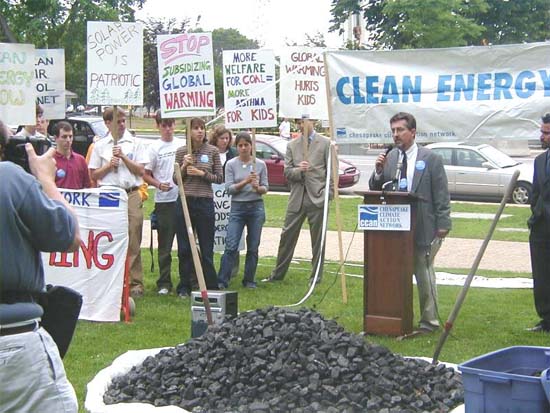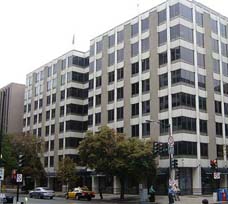
"Because of global warming, this is our future. Oceans worldwide are projected to rise as much as three feet this century, and much higher if the Greenland ice sheet melts away. And intense storms are already becoming much more common. These two factors together will in essence export the plight of New Orleans, bringing the Big Easy "bowl" effect here to the Washington area, as well as to Charleston, S.C., Miami, New York and other coastal cities. Assuming we want to keep living in these cities, we'll have to build dikes and learn to exist beneath the surface of surrounding tidal bays, rivers and open seas -- just like New Orleans." Author Mike Tidwell, founder of the Chesapeake Climate Action Committee, served as a Peace Corps Volunteer in Congo Kinshasa.
Mike Tidwell writes: We're All New Orleanians Now
We're All New Orleanians Now
By Mike Tidwell
Sunday, August 20, 2006; Page B01
How's this for poetic justice? In future years, the White House and all those federal agencies accused of acting too slowly after Hurricane Katrina smashed New Orleans last August will probably find their own D.C. offices threatened by catastrophic flooding from monster storms. They may be hunkering behind massive levees and fantastic floodgates, harried by the annual threat of Katrina-scale hurricanes.
Because one year after the great catastrophe in Louisiana, this much is clear: It's coming here.
Barring a rapid change in our nation's relationship to fossil fuels, every American within shouting distance of an ocean -- including all of us in the nation's capital -- will become de facto New Orleanians. Imagine a giant floodgate spanning the Potomac River just north of Mount Vernon, there to hold back the tsunami-like surge tide of the next great storm. Imagine the Mall, Reagan National Airport and much of Alexandria well below sea level, at the mercy of "trust-us-they'll-hold" levees maintained by the Army Corps of Engineers. Imagine the rest of Washington vulnerable to the winds of major hurricanes that churn across a hot and swollen Chesapeake Bay, its surface free of the once vast and buffering wetland grasses and "speed bump" islands that slow down storms.
Because of global warming, this is our future. Oceans worldwide are projected to rise as much as three feet this century, and much higher if the Greenland ice sheet melts away. And intense storms are already becoming much more common. These two factors together will in essence export the plight of New Orleans, bringing the Big Easy "bowl" effect here to the Washington area, as well as to Charleston, S.C., Miami, New York and other coastal cities. Assuming we want to keep living in these cities, we'll have to build dikes and learn to exist beneath the surface of surrounding tidal bays, rivers and open seas -- just like New Orleans.
We better be ready, because the hurricanes are coming, and they are more ferocious than they were in the past. Multiple scientific studies in the past year have found that rising sea-surface temperatures linked to global warming are causing an increase in the number of stronger hurricanes. One study by the Massachusetts Institute of Technology concluded that hurricane wind speeds have doubled in the past 30 years. This may account for the fact that among the six most powerful hurricanes recorded in the Atlantic Basin -- going back 150 years -- three occurred over 52 days in 2005: Katrina, Rita and Wilma.
Like politics, all global warming is essentially local. Forget the polar ice caps and faraway coral reefs -- it's only real if it's in my back yard. And what's coming to Washington's back yard is now on full display, thanks to the National Academy of Sciences. At the Marian Koshland Science Museum in Washington, under a sign that says "Climate Change Hits Home," hangs a giant satellite map of the Chesapeake Bay watershed. Push a button and you see a simulation of this region succumbing to a three-foot rise in sea level.
I pushed that button recently and watched a huge portion of my state of Maryland disappear. Three feet of water rolls in, and the lower third of Dorchester County on the Eastern Shore is erased. The Blackwater National Wildlife Refuge, often called the Everglades of the North, vanishes entirely -- all 28,000 acres. Historic Smith and Tangier Islands are gone. Water pours into Alexandria and the outer suburbs of Baltimore and Washington while tidal rivers throughout the bay system swell into much larger and wider versions of their former selves.
Cumulatively, the effects create a disturbing picture: The open water along the main stem of the Chesapeake Bay, not far from where the tidal Potomac makes its way up to Washington, nearly doubles in width, giving the impression of the Atlantic Ocean moving into the region in a very serious way.
This permanent high water from global warming, if fully realized, will devastate habitats for birds and crabs and destroy countless vacation properties and other coastal structures. The Federal Emergency Management Agency estimates that no fewer than one in four U.S. buildings within 500 feet of a coastline will be destroyed by erosion by mid-century, with rising sea levels a big factor. Agriculture would also suffer enormously. Already, because of just seven inches of sea-level rise in the 20th century, many miles of former farmland along Maryland's Eastern Shore lie idle from saltwater intrusion. Three more feet of rise would almost certainly seep deep into the groundwater, penetrating aquifers critical to irrigating corn and other crops on the Delmarva Peninsula.
More troubling still is the hurricane highway that this kind of water creates. Marshes and islands are natural speed bumps, slowing the surge of big storms. Without them, a storm slipping through the mouth of the bay would have free rein, behaving practically as it does in the open ocean, bringing new and unthinkable threats to Annapolis, Baltimore and Washington.
Higher sea levels create other conditions that will only enhance hurricanes. In 1985, Hurricane Gloria made landfall north of New York Harbor. As a Category 2 storm, it could have had a serious surge tide. But it was a relative dud, causing only minor flooding. New York got lucky because the storm struck at maximum low tide, when the ocean had conveniently lowered itself a full five feet in relation to the land. Had Gloria arrived just six hours earlier or later, experts say, it would have been a monster, at least as destructive as the Great Hurricane of 1938 that killed 50 Long Islanders and caused billions in damage.
But with three feet of sea-level rise, we will be creating what amount to permanent high-tide conditions in the D.C. region and everywhere else, guaranteeing that even Category 2 storms like Gloria will become surge-tide heavyweights.
"You've got a crisis situation, certainly, for everyone who lives near the Chesapeake Bay," says J. Court Stevenson, a marsh ecologist at the University of Maryland. "The buffering landforms that are the enemy of hurricanes will be gone. And the high water that is the best friend of big storms will be here in abundance."
And none of this considers the growing power, brought on by global warming, of hurricanes themselves. Stronger winds can push around more water, creating even higher surge tides that will roll toward coastlines already locked into disastrous high water. According to a study published in the journal Science last fall, the number of Category 4 and 5 storms has nearly doubled in the past 30 years as the planet has warmed. All of these factors, Stevenson says, mean that "100-year floods" won't come to places such as Washington every 100 years anymore, but as frequently as once every 25 years or even once a decade.
In the face of this sobering data suggesting we're bringing New Orleans to the Potomac, what should we do? Realistically, there are three major options: 1) abandon our coastal cities and retreat inland, a response too staggering to imagine, 2) stay put and try to adapt to the menacing new conditions, or 3) switch to clean energy as fast as possible.
Adapting, of course, means committing fully to the New Orleans model. It means potentially thousands of miles of levees and floodwalls across much of the region. And that's just to handle the rising sea. For hurricane surge tides, Stevenson thinks the only solution might be to build a floodgate across the Potomac near Mount Vernon. It could be closed during periods of maximum danger, then reopened as the surge ebbs. He envisions another on the Patapsco River to protect Baltimore. The New York Academy of Sciences, meanwhile, has examined the idea of three such floodgates for New York City.
But are we truly ready to become New Orleanians, casting our lot behind ever-higher, unsustainable walls? Once we commit to fortified levees and massive floodgates, there's no turning back. It's an all-or-nothing proposition, as New Orleans has graphically demonstrated.
Alternatively, we can go with the third option. It's less expensive, less risky and overall much better for us: clean energy. It's the option that treats the disease of global warming, not just the symptoms. Only by dramatically reducing greenhouse gas pollution -- by switching to hybrid cars and wind- and solar-powered electricity and high-efficiency appliances -- can we slow the sea-level rise and potentially calm the growth in hurricane intensity.
We must join the rest of the world in this effort because, while the effects are local, the solution can only be global. Some adaptation to global warming will still be necessary, given the momentum built into the warming process. And a national clean-energy overhaul will represent a huge challenge to our society, especially given how little time scientists say we have left -- maybe just 10 years -- before runaway climate effects become a reality.
But switching to clean, efficient energy is a challenge compared to what? Compared to life below sea level with a constant eye on the Weather Channel, waiting for the next Category 5 storm to replicate the horrifying events of last Aug. 29?
I've seen the consequences of inaction before. In 2003, my book "Bayou Farewell" chronicled the erosion of coastal Louisiana, leaving the state vulnerable to a killer hurricane that would flatten its cities "like a liquid bulldozer." But Washington didn't act. And today, as New Orleans knows too well, policymakers in D.C. are among the only people in the world whose decisions can directly protect their own homes from global warming. If "Katrina on the Potomac" has a bad ring to it, we can only hope that these leaders will finally do something about it -- and soon.
mwtidwell@aol.com
Mike Tidwell is author of "The Ravaging Tide: Strange Weather, Future Katrinas, and the Coming Death of America's Coastal Cities" (Free Press) and director of the U.S. Climate Emergency Council.
























